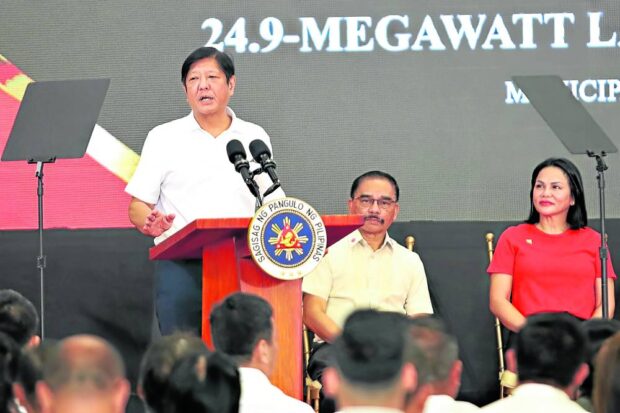
RENEWABLE SOURCES President Marcos, in a speech during the opening of the Lake Mainit Hydro Power Plant on Wednesday, says the government is prioritizing the use of renewables in increasing the country’s energy supply. With the President are Agusan del Norte Gov. Maria Angelica Rosedell Amante (right) and Rep. Dale Corvera. —ERWIN MASCARIÑAS
JABONGA, AGUSAN DEL NORTE—President Marcos has called on the private sector to invest in the building of more renewable energy plants in the country to help address the rising demand for electricity at the same time provide consumers with clean sources of power.
The President made the pitch as he led Wednesday’s inauguration of the 24.9-megawatt (MW) Lake Mainit Hydro Power Plant here that utilizes the waters of the country’s deepest and fourth largest lake.
“As our power demand continues to increase, initiatives and projects such as these are most welcome as they help the country increase its energy supply, improve our energy mix by prioritizing the use of renewables,” Mr. Marcos said.
“The development of this hydropower site is a defining step towards our goal of securing much-needed power for the people of Agusan del Norte and its neighboring areas by taking advantage of its water sources,” he added.
The plant is operated by Agusan Power Corp. (APC), which is a venture between local company Markham Resources Corp. and Japanese firm Electric Power Development Co., Ltd. (J-Power).
Connected to the grid since March this year, the plant is projected to generate 97,565 MW-hours of energy annually and will mainly secure the power needs of up to 45,000 households served by the Agusan del Norte Electric Cooperative Inc. (Aneco). Work on the plant began in 2014, under the administration of the late President Benigno Aquino III.
POWER FROM WATER The newly opened Lake Mainit Hydro Power Plant is powered by three 8.3-megawatt turbines inside this powerhouse in Jabonga, Agusan del Norte. The plant, which
started development in 2014, provides a clean source of energy for consumers in Agusan del Norte. —ERWIN MASCARIÑAS
Fighting env’t threats
Mr. Marcos has underscored the importance of renewables in ensuring an “energy-secure future” for the country, noting that the hydropower plant has “zero carbon emissions during electricity generation.”
“Let this inauguration that we are commemorating today serve as an encouragement to potential investors to invest in the country, especially in the power generation and the renewable energy sector,” Mr. Marcos said.
“I call once again on our private sector partners to join us as we realize our goal of advancing affordable, reliable and clean energy for the benefit of our people. We assure you that this government will continue to improve bureaucratic processes in the energy sector to make it easier for investors to come in,” he added.
The President emphasized that the government’s strong push for renewables “lies at the very core of the eight-point socioeconomic agenda as well as our commitment to mitigate the impact of climate change and to combat other environmental threats.”
Under the country’s 20-year Power Development Plan crafted in 2020, renewable energy must comprise 35 percent of the total energy mix by 2030, increasing to 50 percent by 2040.
Takashi Jahana, executive managing officer of J-Power, vowed to support the country’s drive for renewables through its “abundant experiences with hydroelectric power plants.”
Flood control
According to APC president Francisco Tiu-Laurel Jr., the hydro power plant operates at a lake water level of at least 30 meters.
With its deepest part measured at 219 m, Lake Mainit is fed by 28 tributary rivers and creeks emanating from over 87,000 hectares of catchment area. Its close to 150 square kilometers of surface area contains an estimated 18.36 cubic kilometers of water that drains into the Bohol Sea through Kalinawan River.
Laurel said the lake’s water level could go up to 37 m during the rainy season, causing floods in downstream communities. The plant’s structures help mitigate this perennial problem with at least 700 ha of farmlands now spared from flooding, he added.
With the commissioning of the hydropower plant, Laurel said they started setting their sights on installing floating solar panels in Lake Mainit, to produce up to 100 MW of power.
RELATED STORY:
Clean energy investments in ASEAN down over 50% last year